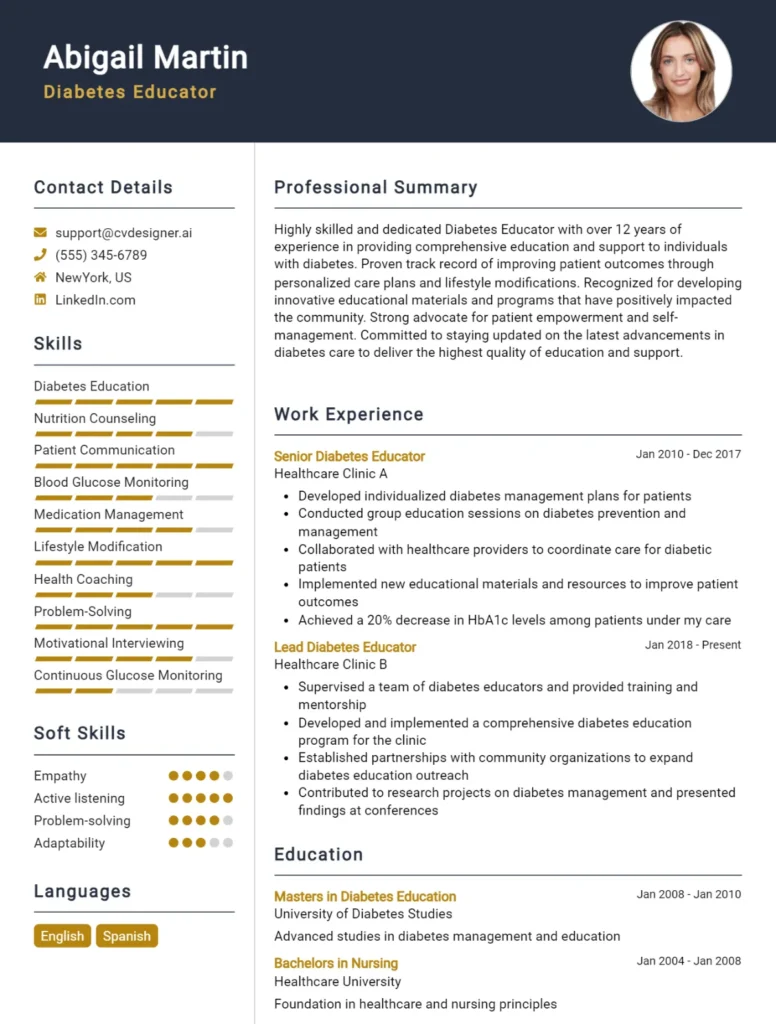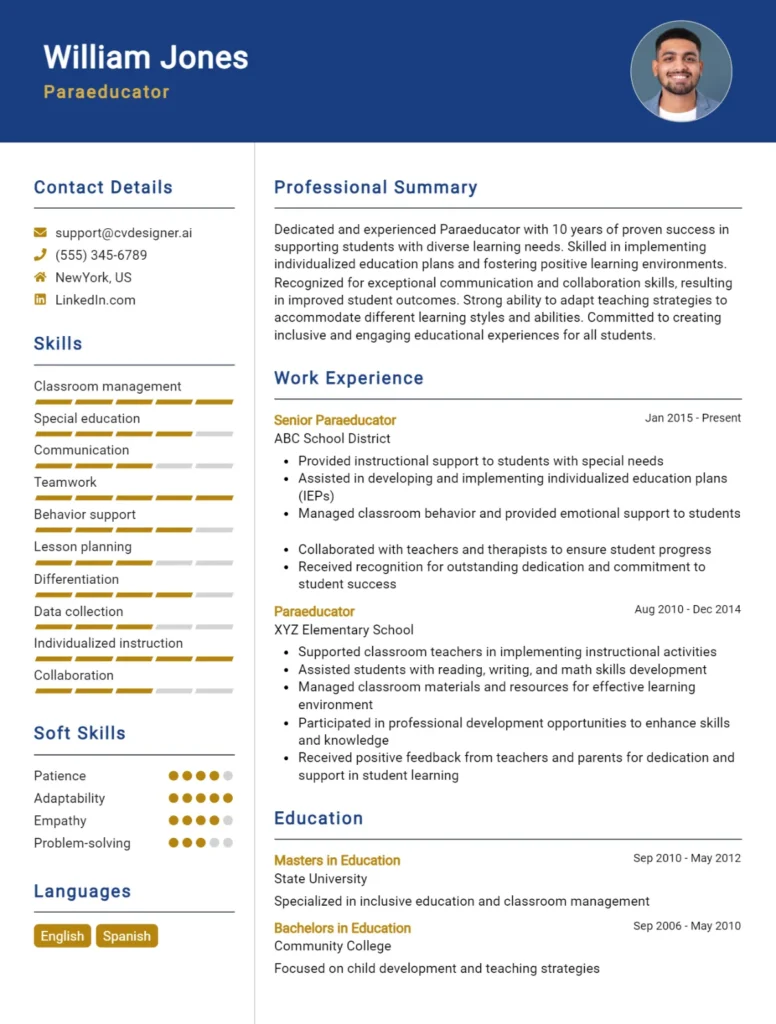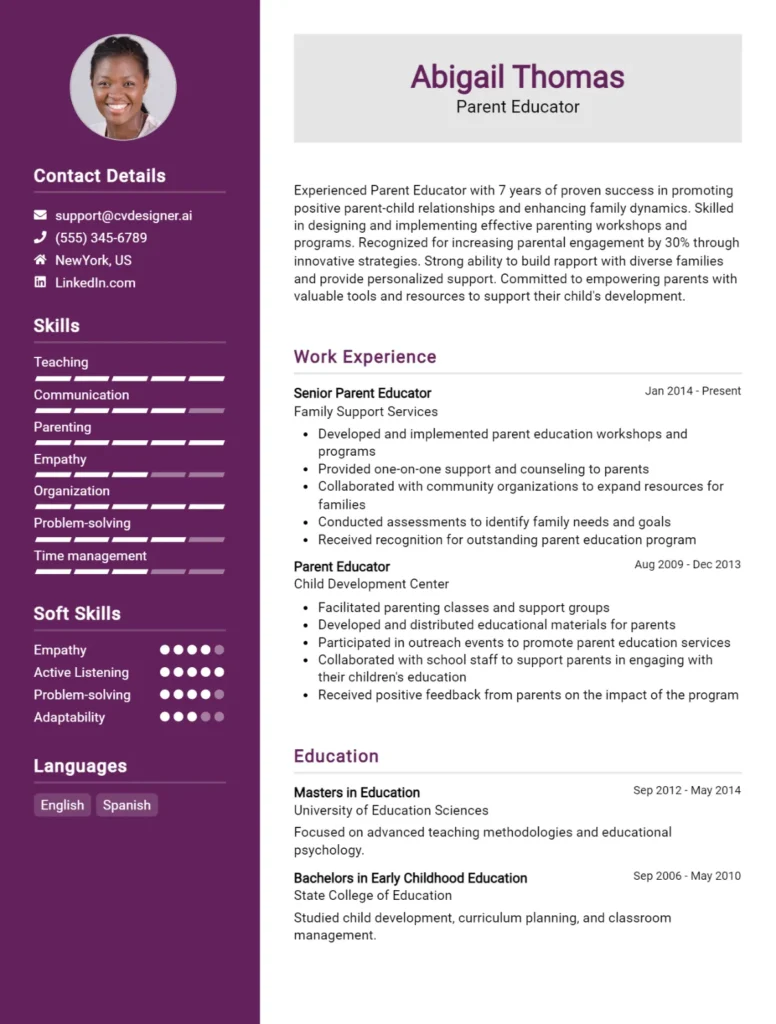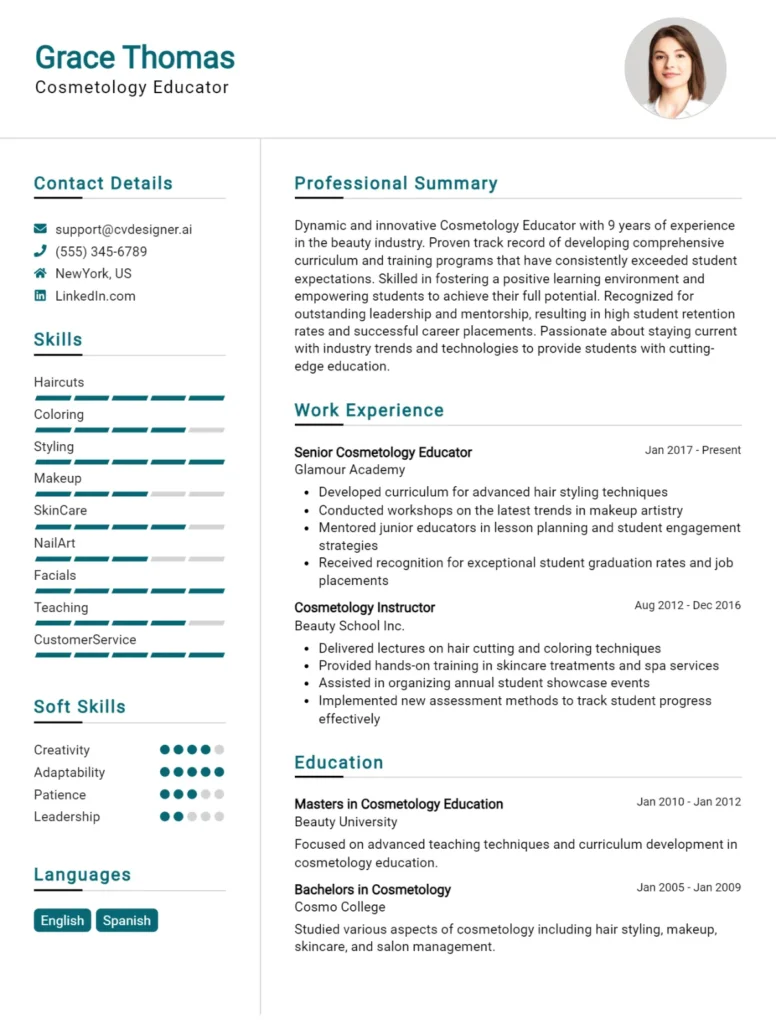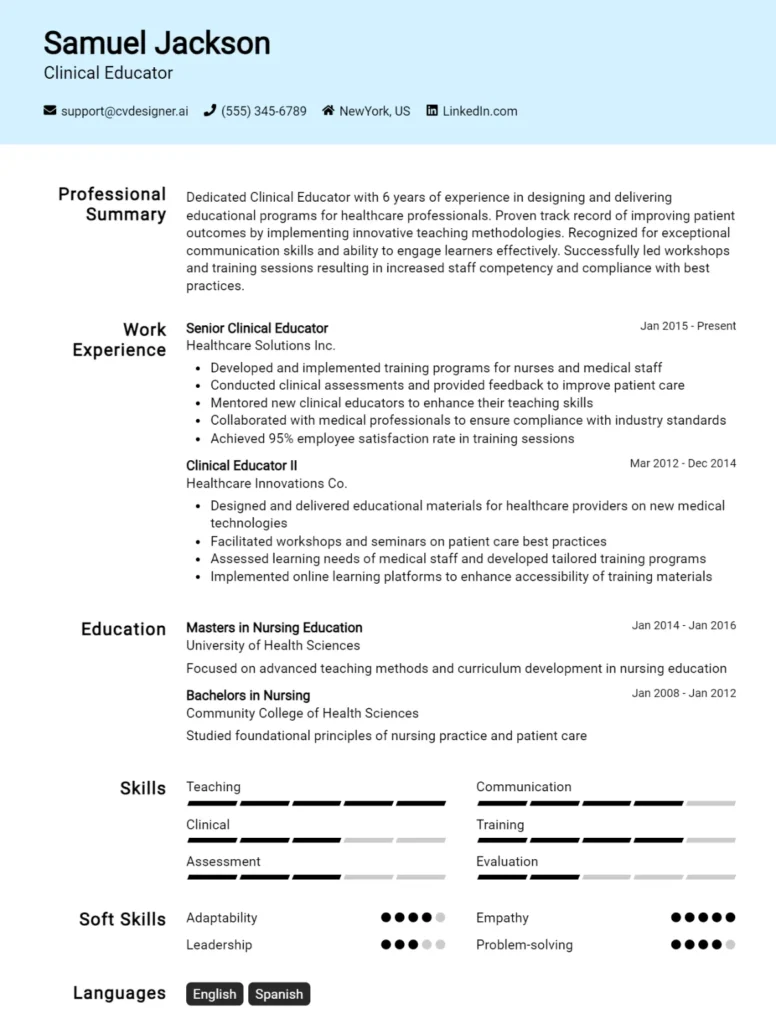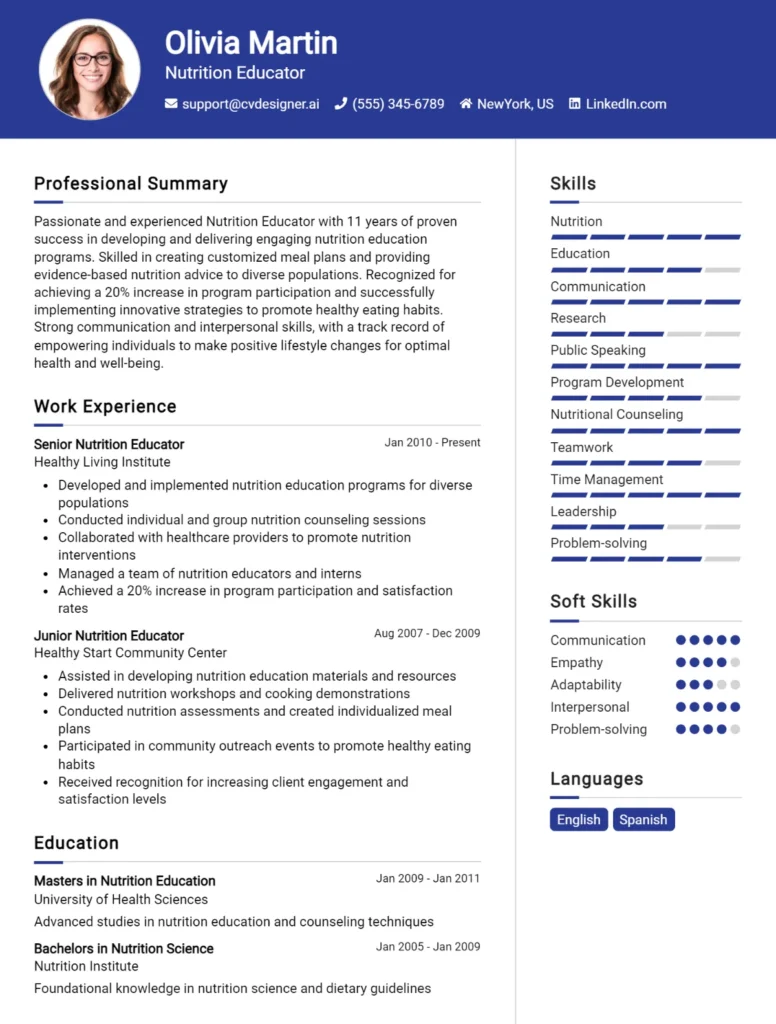Most Popular Educator CV Examples
Explore additional Educator CV samples and guides and see what works for your level of experience or role.
Crafting the perfect CV as an educator can be a daunting task, but it’s essential for showcasing your qualifications, experience, and passion for teaching. This guide is designed to walk you through the critical elements of an effective educator CV, ensuring that you stand out in a competitive job market. By the end of this article, you will have a clear understanding of how to structure your CV, what to include, and how to tailor it to the specific teaching position you’re aiming for. We’ll cover:
- The key components of an educator CV
- Tips for highlighting your teaching philosophy and achievements
- How to effectively showcase your relevant certifications and education
- Strategies for addressing gaps in employment and other potential concerns
- A sample CV to serve as a model for your own crafting
Whether you're a seasoned professional or just starting your teaching journey, this guide will equip you with the knowledge and tools necessary to create a compelling CV that reflects your unique strengths and experiences. Let’s dive in!
What is a Educator CV?
A CV for an educator serves as a comprehensive overview of an individual's qualifications, experiences, and skills relevant to the teaching profession. It typically includes sections on education, certifications, teaching philosophy, and relevant work experience, allowing educators to present their professional journey in a structured manner. This document is essential not only for job applications but also for showcasing one's commitment to continuous professional development. An effective CV can set a candidate apart in a competitive job market by highlighting unique strengths and accomplishments. For those looking for guidance on crafting their CV, a cv writing guide can be invaluable.
In addition to showcasing qualifications, a well-crafted educator CV reflects the individual's teaching style and passion for education. It allows educators to articulate their contributions to student learning and community involvement, which are critical in educational settings. Utilizing a cv maker can streamline the process, providing templates and tips to create a visually appealing and professional document. Ultimately, a strong CV is a vital tool for educators seeking to advance their careers and make a meaningful impact in the classroom.
Key Components of a Educator CV
- Contact Information: Include your full name, phone number, email address, and location. Make sure this information is up-to-date and professional.
- Professional Summary: A brief overview of your teaching philosophy, relevant experience, and what makes you a strong candidate for the educator role.
- Education: List your degrees, certifications, and any relevant coursework. Highlight your major and institution.
- Teaching Certifications: Include any state or national teaching certifications, endorsements, or licenses you hold.
- Skills: Highlight specific skills related to education, such as classroom management, lesson planning, and technology integration. For a detailed guide on skills to include, refer to skills.
- Work Experience: Detail your previous teaching positions, including the name of the institution, your role, and the duration of employment. Emphasize your responsibilities and achievements in each position. For more on how to present your work experience, visit work experience.
- Professional Development: List any workshops, seminars, or additional training you have completed that enhance your teaching abilities.
- Curriculum Development: Mention any experience you have in designing or adapting curricula to meet student needs.
- Technology Proficiency: Highlight your experience with educational technology, online teaching platforms, and software relevant to modern classrooms.
- Extracurricular Involvement: Include any roles or contributions to school clubs, sports, or community service that demonstrate your commitment to student development outside the classroom.
- References: Provide a list of professional references who can speak to your teaching abilities and character. Ensure you have their permission before including them.
- Awards and Honors: Mention any recognitions or awards you have received in your teaching career, such as "Teacher of the Year" or grants for educational projects.
Sample Educator CV for Inspiration
[Your Name]
[Your Address]
[City, State, Zip Code]
[Your Email Address]
[Your Phone Number]
[LinkedIn Profile URL]
Professional Summary
Dedicated and passionate educator with over 10 years of experience in fostering a positive learning environment and facilitating student growth. Proven track record in developing innovative curricula and engaging instructional materials that cater to diverse learning styles. Committed to promoting critical thinking and a love for learning among students. Strong communicator with the ability to build relationships with students, parents, and colleagues.
Work Experience
Senior Educator
[School Name], [City, State]
[Month, Year] – Present
- Developed and implemented comprehensive lesson plans that meet the diverse needs of students in grades 9-12.
- Utilized technology to enhance the curriculum, integrating digital tools and resources to support interactive learning.
- Mentored new teachers and provided professional development workshops on effective teaching strategies and classroom management.
- Collaborated with colleagues to design interdisciplinary projects that encourage teamwork and critical thinking among students.
- Organized and led extracurricular activities that promote student engagement and community involvement.
Educator
[School Name], [City, State]
[Month, Year] – [Month, Year]
- Taught a variety of subjects, including English, Mathematics, and History, to students in grades 6-8.
- Developed and assessed student performance through formative and summative assessments to monitor progress and adjust teaching methods accordingly.
- Fostered a classroom environment that encourages respect, inclusivity, and open communication, resulting in high student engagement and participation.
- Collaborated with parents and guardians to discuss student progress and strategies for improvement.
Teaching Assistant
[School Name], [City, State]
[Month, Year] – [Month, Year]
- Supported lead teachers in the classroom by preparing instructional materials and assisting with classroom management.
- Provided one-on-one support to students with special needs, ensuring their full participation in class activities.
- Assisted in organizing school events and activities that promote a sense of community and school spirit.
Education
Master of Education (M.Ed.) in Curriculum and Instruction
[University Name], [City, State]
[Month, Year]
Bachelor of Arts in Education
[University Name], [City, State]
[Month, Year]
Skills
- Classroom Management
- Curriculum Development
- Differentiated Instruction
- Educational Technology
- Assessment and Evaluation
- Communication Skills
- Team Collaboration
- Conflict Resolution
Publications
- [Title of Article/Book], [Publisher/Journal Name], [Year]
- [Title of Article/Book], [Publisher/Journal Name], [Year]
Certifications
- Certified Teacher, [State Certification Board], [Year]
- ESL Certification, [Institution Name], [Year]
- First Aid and CPR Certified, [Institution Name], [Year]
Educator CV Writing Tips
When crafting a CV as an educator, it's essential to highlight your teaching philosophy, relevant experience, and achievements in a clear and organized manner. Start with a strong personal statement that reflects your passion for education and your commitment to student success. Use bullet points for your work experience to make it easy for hiring managers to scan through your qualifications quickly. Tailor your CV for each application by emphasizing the skills and experiences that align with the specific role you are applying for. Additionally, include any certifications or professional development courses that enhance your teaching abilities. Finally, ensure your CV is free from errors and formatted consistently for a polished and professional appearance.
- Start with a strong personal statement: Summarize your teaching philosophy and what makes you a unique candidate.
- Highlight relevant experience: Focus on your teaching roles, including internships, volunteer work, and any educational programs you've been a part of.
- Use bullet points: Present your work experience in bullet points to improve readability and clarity.
- Showcase achievements: Quantify your accomplishments (e.g., improved student test scores, successful program implementations) to demonstrate your impact.
- Include professional development: List any relevant certifications, workshops, or courses that enhance your qualifications.
- Tailor your CV: Customize your CV for each job application by aligning your skills and experiences with the job description.
- Maintain a clean format: Use consistent fonts, headers, and spacing to create a professional look.
- Proofread thoroughly: Check for spelling and grammatical errors to ensure your CV is polished and professional.
Educator CV Summary Examples
As an educator, your CV summary is a crucial component that highlights your qualifications, teaching philosophy, and unique skills. Here are several examples of effective CV summaries that can inspire you to craft your own:
“Dedicated and passionate educator with over 8 years of experience in fostering a love for learning in students from diverse backgrounds. Proven ability to develop engaging curriculum and utilize innovative teaching methods to enhance student understanding and performance.”
“Dynamic classroom leader with a strong commitment to student achievement and well-being. Experienced in implementing differentiated instruction to meet the varied needs of learners, while also promoting a positive and inclusive classroom environment.”
“Results-driven educator with a Master’s degree in Education and extensive experience in both traditional and online teaching formats. Skilled in utilizing technology to enhance learning experiences and facilitate collaboration among students.”
“Enthusiastic and creative educator with a track record of integrating real-world applications into lesson plans. Adept at fostering critical thinking and problem-solving skills in students, preparing them for future academic and personal success.”
“Compassionate and innovative educator with a focus on social-emotional learning and development. Committed to building strong relationships with students and families to create a supportive learning community that encourages growth and resilience.”
Build a Strong Experience Section for Your Educator CV
As an educator, your experience section is crucial in showcasing your teaching philosophy, classroom management skills, and commitment to student development. Highlighting specific achievements and responsibilities can set you apart from other candidates. Below are examples of strong work experience descriptions that effectively convey your qualifications and impact in previous roles.
- Developed and implemented engaging lesson plans for a diverse classroom of 25 students, incorporating various instructional strategies to accommodate different learning styles and ensure student comprehension.
- Collaborated with fellow educators to create a school-wide literacy program that improved reading proficiency by 15% among students in grades 3-5 over the course of one academic year.
- Conducted regular assessments and provided timely feedback to students and parents, fostering a transparent communication environment that promoted academic growth and addressed individual learning needs.
- Organized and led after-school tutoring sessions, resulting in a 20% increase in student participation and noticeable improvements in overall academic performance for struggling learners.
- Facilitated professional development workshops for colleagues on integrating technology into the classroom, enhancing digital literacy and engagement among educators and students alike.
- Mentored new teachers through a structured induction program, providing guidance on classroom management techniques and curriculum development, which contributed to a smoother transition into the teaching profession.
- Initiated a community outreach program that connected students with local organizations, promoting civic engagement and providing real-world learning experiences that enriched the curriculum.
- Actively participated in school committees focused on curriculum development, contributing to the revision of interdisciplinary units that fostered critical thinking and collaboration among students.
Educator CV Education Examples
As an Educator, a strong educational background is essential to effectively impart knowledge and inspire students. Here are several examples of relevant educational qualifications that can enhance an educator's profile:
- Bachelor of Arts in Education
This degree provides foundational knowledge in teaching methodologies, curriculum development, and educational psychology, preparing educators to effectively engage with diverse student populations. - Master of Education (M.Ed.)
A Master’s degree in Education allows educators to specialize in areas such as curriculum and instruction, educational leadership, or special education, enhancing their ability to address varied educational needs. - Bachelor of Science in Early Childhood Education
Focusing on the developmental stages of young children, this degree equips educators with strategies to foster a positive learning environment for preschool and elementary-aged students. - Ph.D. in Educational Leadership
This advanced degree prepares educators for leadership roles, providing deep insights into educational policy, administration, and research, enabling them to influence systemic changes in educational institutions. - Certificate in Special Education
A certification in special education equips educators with the skills necessary to support students with diverse learning needs, ensuring that all students receive a quality education tailored to their individual requirements.
Skills to Highlight in Your Educator CV
As an educator, possessing a balanced mix of soft and hard skills is crucial for fostering a productive learning environment and effectively imparting knowledge. Highlighting these skills on your CV can demonstrate your ability to connect with students, adapt to diverse learning needs, and utilize educational tools to enhance classroom experiences. Below are essential skills that every educator should consider showcasing in their CV.
Soft Skills:
- Communication – Ability to clearly convey information and engage with students, parents, and colleagues.
- Empathy – Understanding and addressing the emotional and academic needs of students.
- Adaptability – Flexibility in adjusting teaching methods to accommodate various learning styles.
- Patience – Maintaining composure and support when students face challenges.
- Leadership – Guiding and inspiring students to achieve their goals and fostering a collaborative classroom environment.
- Creativity – Developing innovative lesson plans and activities that capture students' interests.
- Problem-solving – Identifying challenges and implementing effective solutions in the classroom.
- Time management – Balancing multiple tasks, such as lesson planning, grading, and classroom management.
- Conflict resolution – Navigating disagreements among students and fostering a positive atmosphere.
- Teamwork – Collaborating effectively with fellow educators and staff to enhance the educational experience.
Hard Skills:
- Curriculum development – Designing and implementing educational programs and lesson plans.
- Assessment techniques – Proficiency in creating and administering tests and evaluations to measure student progress.
- Educational technology – Utilization of digital tools and resources to enhance teaching and learning.
- Classroom management – Strategies for maintaining an organized and productive classroom environment.
- Subject matter expertise – In-depth knowledge of specific academic disciplines.
- Data analysis – Ability to analyze student performance data to inform instructional practices.
- Special education knowledge – Understanding of individualized education plans (IEPs) and strategies for inclusive teaching.
- Instructional design – Crafting effective learning experiences tailored to different student needs.
- Bilingual communication – Proficiency in multiple languages to support diverse student populations.
- Professional development – Commitment to continuous learning and improvement through workshops and courses.
Educator CV Format
As an educator, presenting your qualifications effectively is essential to securing the right job opportunities. A well-structured CV can make a significant difference, whether you're an entry-level teacher or an experienced administrator. The best format for your CV often depends on your level of experience and the specific role you are applying for. For instance, entry-level educators may benefit from a chronological format that highlights relevant coursework and internships, while seasoned professionals might prefer a functional format that emphasizes their achievements and leadership skills.
- Entry-Level Educator: Focus on education, internships, and relevant coursework. Use a chronological format to showcase your academic achievements and any teaching experience.
- Mid-Level Educator: Highlight teaching experience and professional development. A combination format works well here, showcasing both skills and work history.
- Senior Educator/Administrator: Emphasize leadership roles and significant contributions to educational programs. A functional format can help to highlight achievements and administrative skills.
- Specialized Roles (e.g., Special Education, ESL): Tailor your CV to reflect specialized training and experience. Use a format that showcases relevant certifications and specialized skills prominently.
- Academic Positions: Include publications and research experience. A chronological format is often preferred to demonstrate a clear academic trajectory and contributions to the field.
- When in Doubt: Use a clean, professional layout with clear headings and bullet points for easy readability. For more details on CV formats, check out this cv format guide for additional insights.
Common Mistakes to Avoid in a Educator CV
Creating a compelling CV as an educator is crucial for making a strong impression on potential employers. Your CV is a reflection of your professional journey, showcasing your qualifications, experiences, and teaching philosophy. However, many educators inadvertently make mistakes that can undermine their chances of securing an interview. Here are some common pitfalls to avoid when crafting your educator CV:
- Failing to tailor the CV to the specific job application, leading to a generic presentation.
- Including irrelevant work experiences that do not pertain to education or teaching.
- Not using clear and concise language, which can make your CV hard to read.
- Overloading the CV with jargon or educational terminology that may not be universally understood.
- Neglecting to highlight measurable achievements, such as improved student outcomes or successful programs initiated.
- Omitting important sections, such as certifications, professional development, or relevant volunteer experiences.
- Using an unprofessional email address or contact information that detracts from your professionalism.
- Ignoring formatting consistency, which can create a disorganized appearance.
- Focusing too much on duties rather than the impact of your contributions in previous roles.
- Not proofreading for grammar, spelling, or punctuation errors, as these can create a negative impression.
Key Takeaways for a Educator CV
- Start with a strong summary statement that captures your teaching philosophy and career objectives.
- Highlight your educational qualifications, including degrees, certifications, and relevant coursework related to education.
- Emphasize your teaching experience, detailing specific roles, responsibilities, and the subjects or grade levels taught.
- Include any additional duties undertaken, such as curriculum development, extracurricular activities, or mentorship roles.
- Showcase your skills, focusing on both hard skills (e.g., lesson planning, classroom management) and soft skills (e.g., communication, adaptability).
- Quantify your achievements where possible, using metrics to demonstrate student performance improvements or successful projects.
- Incorporate relevant professional development experiences, such as workshops, conferences, or additional certifications.
- Tailor your CV to the specific job you are applying for, using keywords from the job description to align your experience with the position.
- Include technology skills, especially your familiarity with educational tools and online learning platforms.
- Provide examples of your contributions to a positive school culture, such as participation in committees or community outreach.
- Don’t forget to add references or a statement about their availability, ensuring they are relevant to the education field.
- Utilize available resources like cv templates or a cv builder to create a visually appealing format, and consider adding a cover letter to enhance your application.
Build your CV in minutes
Use an AI-powered cv builder and have your cv done in 5 minutes. Just select your template and our software will guide you through the process.

